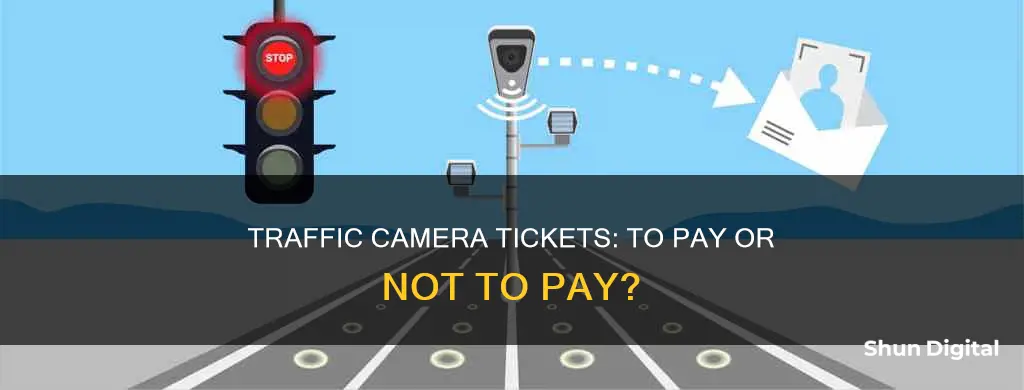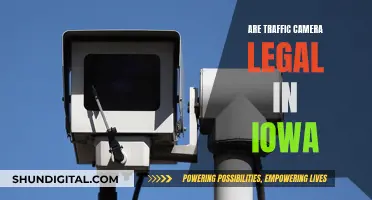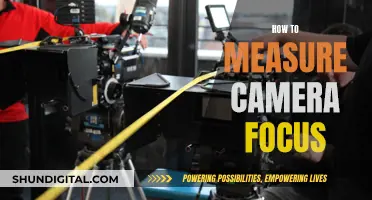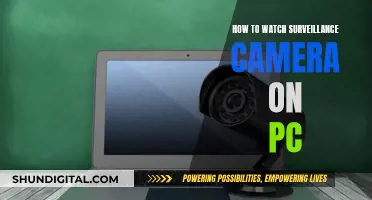
Whether or not to pay a traffic camera ticket is a tricky question. While paying the fine may seem like the easiest option, there are situations where it might not be the best choice. In some places, traffic camera tickets are considered civil violations, akin to parking tickets, and therefore do not count against you on your driving record or increase your insurance costs. However, failure to pay these tickets can result in other consequences, such as the state's Department of Motor Vehicles blocking your vehicle registration or the city starting collections on the fine. On the other hand, paying the ticket means pleading guilty, which can have long-term consequences on your driving record, insurance rates, and even employment prospects if you drive for a living. As such, it is important to understand the specific laws and regulations regarding traffic camera tickets in your area and carefully consider the options available to you before making a decision.
What You'll Learn

Paying a traffic camera ticket means pleading guilty
When you pay a traffic camera ticket, you are essentially admitting guilt. This means that you are comfortable with the consequences that come with pleading guilty to a traffic violation. While paying the fine may be the fastest and most convenient option to resolve the issue, it is important to understand the potential long-term ramifications of this decision.
Firstly, paying the ticket will result in a monetary fine. The amount of the fine will vary depending on the nature and severity of the violation. For example, in Iowa, a fine of $75 is imposed for driving 10 miles per hour over the speed limit, while a $100 fine is issued for speeding in a work zone at the same speed. These fines can significantly impact your finances, especially if you are already facing financial constraints.
Secondly, paying a traffic camera ticket can have consequences for your car insurance. Insurance companies assess risk based on your driving record, and any moving violation, including those captured by traffic cameras, will increase the risk profile associated with insuring you. As a result, your insurance rates are likely to increase. For instance, studies have shown that a speeding ticket for driving 16 to 29 miles per hour over the speed limit can lead to a 22% increase in insurance rates. This can translate to a substantial financial burden, especially when considering the already high average cost of car insurance in certain states, such as Washington, where the average annual cost is $1,371.
Thirdly, if you rely on driving for your livelihood, paying a traffic camera ticket can impact your current and future employment prospects. Many companies that employ drivers require them to have a clean driving record. They may consider you too expensive to insure if your driving record shows multiple violations. Consequently, you may face difficulties in finding employment or even lose your current job due to your driving record.
Finally, accumulating multiple traffic camera tickets can lead to license suspension or revocation. For instance, in Washington, a newly implemented statute mandates a 60-day license suspension if a driver accumulates three or more moving violations within a year or four or more moving violations within two years.
In conclusion, while paying a traffic camera ticket may seem like a straightforward option, it is important to recognize that it constitutes a guilty plea and can have far-reaching consequences. These consequences can impact your finances, insurance rates, employment prospects, and driving privileges. Therefore, it is advisable to carefully consider your options and, if necessary, seek legal advice before deciding whether to pay the ticket or contest the charge in court.
Montebello Camera Tickets: Do You Have to Pay?
You may want to see also

A traffic camera ticket is a civil violation
In some jurisdictions, traffic camera tickets are heard by hearing officers in an administrative hearing. If found to be in violation, the only penalty that can be imposed is a civil monetary fine and cost. These hearings are civil in nature, so points may not be assessed against your license.
In Seattle, for example, camera tickets are filed with the Seattle Municipal Court and are processed like parking tickets. They will not appear on your state driving record, but unpaid tickets may cause the Department of Licensing to place a hold on your vehicle registration.
It's important to note that the laws regarding traffic camera tickets vary depending on the jurisdiction, so it's always a good idea to consult with a lawyer or legal professional for advice.
Olympus Cameras: High-Res Mode Options Explored
You may want to see also

Traffic camera fines are usually cheap(ish)
The cost of a traffic camera fine varies depending on the location and the severity of the violation. In Seattle, for example, there is a 20 mph speed limit near elementary and middle schools, and a violation will result in a fine. In Iowa, the proposed fines for speeding are $75 for driving 10 mph over the limit, $100 for 20 mph over, and so on, up to $500 for driving 30 mph or more over the speed limit. These fines are relatively low compared to the potential increase in insurance costs.
It's worth noting that traffic camera citations are different from traditional traffic tickets. They are considered civil violations, similar to parking tickets, and are typically heard by hearing officers in an administrative hearing. As a result, points may not be assessed against your license, and collection agents may be responsible for enforcing the civil penalties. In some states, such as Texas, traffic camera tickets are no longer issued due to privacy concerns and legal ambiguities.
While paying a cheap(ish) traffic camera fine may seem like a straightforward solution, it's always a good idea to understand your options and the potential consequences before making a decision. Consulting with a lawyer or legal professional can help you make an informed choice that considers your specific circumstances and driving record.
Cop Camera Battery Life: How Long Does It Last?
You may want to see also

A traffic camera ticket will not count against your driving record
In most states, a traffic camera ticket will not raise your car insurance rates. However, there are a few exceptions. In Arizona, California, and Oregon, a red light camera ticket is considered a moving violation and can result in points being added to your driver's license. In these states, a traffic camera ticket can affect your insurance rates.
It's important to note that while a traffic camera ticket may not count against your driving record or impact your insurance rates, there are still consequences for not paying the fine. In some cases, the state's Department of Motor Vehicles or the county assessor may prevent the registration of the vehicle that violated the law. This is known as a scofflaw block. Additionally, the city where you live may start collections on the fine.
While you may not face legal consequences for not paying a traffic camera ticket, it is still advisable to practice safe driving and follow the rules of the road. Speeding is against the law, and it's crucial to drive with caution, especially around schools and community safety zones.
Unlocking Creative Photography with the Sports Mode
You may want to see also

In some states, traffic camera fines are now virtually optional
Should I pay my traffic camera ticket?
The enforceability of traffic camera citations varies across states. In some states, such as Alabama, Alaska, Arizona, and many others, payment of these citations is now virtually optional due to a 2016 policy decision by the three major credit reporting agencies. As part of a legal settlement, these agencies agreed not to report any debt that did not "arise from any contract or agreement to pay", which includes traffic camera fines. As a result, non-payment of these fines will likely only result in the debt being collected by a collection agency, without any negative impact on the individual's credit report.
However, it is important to note that the consequences of not paying traffic camera fines can vary depending on the specific location and circumstances. In some cases, the state's Department of Motor Vehicles or the county assessor may block the registration of the vehicle that violated the law, or the city may start collections on the fine. Therefore, it is always recommended to consult with a lawyer or legal professional for advice on how to handle these types of tickets.
Speeding Camera Tickets: Impact on Your CDL
You may want to see also
Frequently asked questions
If you fail to pay your ticket, the state's Department of Motor Vehicles may prevent registration of the vehicle that violated the law. This is called a "scofflaw block" and can also affect your credit score. The city where you live may also start collections on the fine.
Paying your ticket is effectively pleading guilty. This can have long-term consequences on your car insurance and current and future employment, especially if you drive for a living.
Paying the fine is the fastest way to resolve the situation.
Paying the ticket means you are pleading guilty, which can have long-term consequences on your car insurance and current and future employment.







